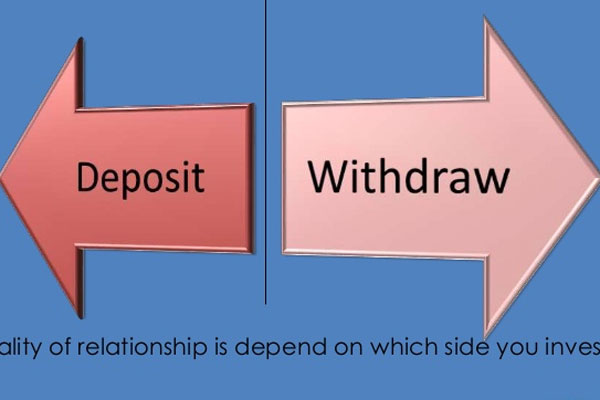
Relationships by their very nature are strategic instruments that can propel and accelerate our progress in ways that money alone could never achieve or match. As we pursue the creation of trans-generational wealth in our strategic plans, our goals and definitions of success would have a faulty premise if we overlook the depth of wealth that lies in our relationships. In the same way that we measure and account for every cent in our financial growth, we ought to also pay attention to every action and measure every word in our relational transactions. A strategic life plan which lacks an emphasis on how we plan to nourish and manage our personal, business and social relationships, is at most not sustainable.
inspiration with Cynthia C Hakutangwi

How healthy is your emotional bank account?
Years ago, Stephen Covey introduced the emotional bank account, a concept that is becoming more pertinent in this era of diminishing quality relationships. Covey’s premise is that relationships are like bank accounts that begin with a zero balance. His advice is that we should never withdraw more than we deposit or seek to “get” before we give. When continuous deposits are made with another person through positive, healthy and quality conduct, a reserve is built up in our emotional bank account with that person. Levels of trust towards us increase as we exhibit more integrity, appreciation and understanding. On the other hand, insensitivity, insincere actions, and being overly critical depress our account, because withdrawals are being made from it.
Relationships should occupy a superior position which is clearly articulated in the vision, mission, strategy, goals and budget within our life plan. When we value relationships in our strategy, we are less likely to fall into the temptation of “loving things and using people” but rather we develop a culture of “loving people and using things” to reach our ultimate goals. When we have a wealthy emotional bank account, there is stability to the extent that we can afford to have disagreements without immediately feeling the need to write off the relationship. Conflicts can be resolved when our account is not overdrawn. This requires thoughtfulness, kindness, loyalty, openness, honesty and truly trying to understand others.
You are responsible for your nourishment
When you nourish something, you supply it with what is necessary to sustain life and growth. What fills your soul with life? Which hobbies, activities, or daily rituals bring you joy or a deep sense of satisfaction? If you take care of yourself, if you get support, if you nourish yourself… the people in your life will benefit. Those people will then positively impact others and we can be assured to have nourished families, societies and nations. When you are well- nourished you will think better, feel better and make better decisions.
How have we managed our relationships?
- Chamisa under fire over US$120K donation
- Mavhunga puts DeMbare into Chibuku quarterfinals
- Pension funds bet on Cabora Bassa oilfields
- Councils defy govt fire tender directive
Keep Reading
None of us are perfect. As human beings, we make mistakes; some of a trivial nature, some a lot more significant. But we make them. And sometimes these mistakes affect other people and we have to ask for their forgiveness. But what happens if someone else makes a mistake that affects us, and we have to decide whether to give them a second chance? Many times in our lives, we will upset others; we will anger them, hurt them, bother them, disappoint them, or let them down. But then there are other times where we make them feel appreciated, cared for, and we give them all we can. We only try to live the best life we can, we try to make others happy the best way we know how; but sometimes we get it wrong. As do the people around us. However, when someone shows remorse, shows genuine promise that they are willing to try to change; that is when they might deserve a second chance with you. It is up to you whether you want to take that risk. The important thing for you to realise is that they could hurt you again; you might even regret giving them a second chance. But ask yourself this, what would you regret more — staying, but risking getting hurt again? Or walking away and losing something that may have been worth keeping?
Make it right
If you get a second chance, do everything you can to make things right this time. Avoid the things that led you to the mistakes you’ve made and go the right path this time. Make sacrifices just to prove you deserve the chance you are given. Remember that every opportunity has a shelf life. If you waste a second chance at fixing a wrong, then you may never be trusted again with another chance.
If you were to list down the most important people in your life and look at those bank accounts today, what would you find? As the year nears its end, what little things could you do to nourish and replenish the critical accounts in your life? In our review of the months gone past, may we take time to diagnose and assess the depth of withdrawals in our relationships with our family members, employees, colleagues and strategic spheres of influence.
Cynthia Hakutangwi is a communications and personal development consultant, life coach, author and strategist. Looking at improving balance, energy, organisation, health fitness, relationships, focus, faith and happiness? Wholeness Incorporated Coaching offers you strategies and simple steps you can implement today to become a better, more balanced, happier version of yourself. E-mail: [email protected]. Facebook: Wholeness Incorporated.











